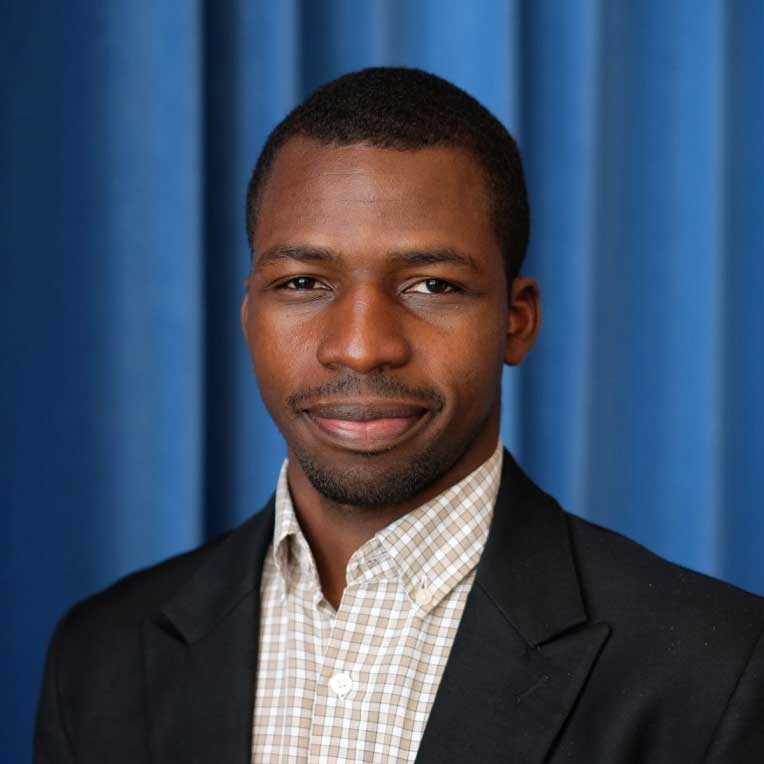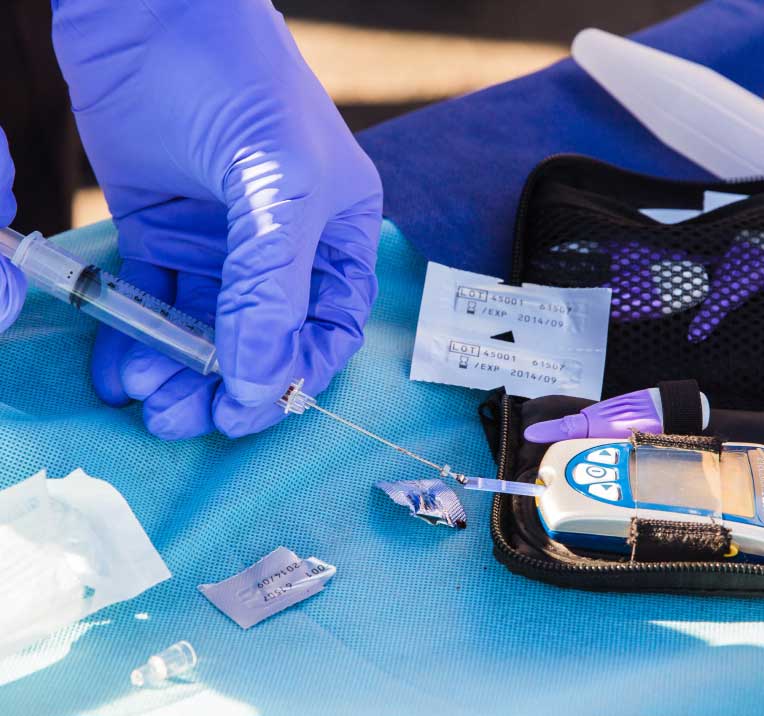Roch Nianogo
Roch Nianogo earned the Toffler Scholar Award in 2022 at UCLA’s Fielding School of Public Health
Biography
The middle child of three boys, Dr. Roch Nianogo grew up in Ouagadougou (pronounced “Wagadugu”), which is the capital and largest city of Burkina Faso, a country in West Africa. Dr. Nianogo’s father, who is a retired professor of agronomy, and his mother, who is a retired accountant, still live in Ouagadougou. So do his older and younger brother, who are a geographic information systems specialist and a professor of economics, respectively.
Throughout his childhood, Dr. Nianogo always wanted to be a physician. Although he’s not entirely certain how this interest emerged, he knows he always wanted to help people. He also suspects it might have been inspired in part by his godfather, who was a physician.
As a young student, Dr. Nianogo struggled to learn. He realized that he didn’t know how to study — how to memorize and retain information. But around the age of 12, he finally figured it out. From that point forward, learning and school became “pretty fun.” He caught up quickly with his studies, soon discovering that he loved math and science as much as he loved medicine. A few years later, as he began pursuing his MD in General Medicine from Université de Ouagadougou in Burkina Faso, he was pleased to see that medicine brought together all three.
While completing his MD program internships, Dr. Nianogo noticed that a lot of patients were coming into the clinics, often repeatedly. What if, he wondered, we could stop these illnesses and diseases from happening in the first place? And so was born Dr. Nianogo’s interest in preventive medicine, public health, and epidemiology.
After Dr. Nianogo graduated with his MD from Université de Ouagadougou, his godfather

suggested he continue his studies at UCLA because it was a public university. A year later, after learning English and applying to schools, Dr. Nianogo was accepted into and entered UCLA’s community health sciences program. Those years of focused study allowed Dr. Nianogo to think in earnest about what he wanted to do. Ultimately, his interest in global health issues, preventive medicine, public health, and epidemiology converged to lead him into translational research. So, after graduating with his MPH in Public Health and his PhD in Epidemiology from UCLA’s Fielding School of Public Health, he remained there to do his post-doctoral work.
Dr. Nianogo is an Assistant Professor in the Department of Epidemiology at the UCLA Fielding School of Public Health, where he researches the impact of modifiable lifestyle factors on both the prevention and progression of chronic health conditions like cardiovascular disease, diabetes, cancer, dementia, and Alzheimer’s disease and other dementias.
“I want to help others. I also have always been very interested in math and science. Now that I'm in public health and epidemiology, I’m able to bring all my interests together.”
– Dr. Roch Nianogo

Biography
The middle child of three boys, Dr. Roch Nianogo grew up in Ouagadougou (pronounced “Wagadugu”), which is the capital and largest city of Burkina Faso, a country in West Africa. Dr. Nianogo’s father, who is a retired professor of agronomy, and his mother, who is a retired accountant, still live in Ouagadougou. So do his older and younger brother, who are a geographic information systems specialist and a professor of economics, respectively.
Throughout his childhood, Dr. Nianogo always wanted to be a physician. Although he’s not entirely certain how this interest emerged, he knows he always wanted to help people. He also suspects it might have been inspired in part by his godfather, who was a physician.
As a young student, Dr. Nianogo struggled to learn. He realized that he didn’t know how to study — how to memorize and retain information. But around the age of 12, he finally figured it out. From that point forward, learning and school became “pretty fun.” He caught up quickly with his studies, soon discovering that he loved math and science as much as he loved medicine. A few years later, as he began pursuing his MD in General Medicine from Université de Ouagadougou in Burkina Faso, he was pleased to see that medicine brought together all three.
While completing his MD program internships, Dr. Nianogo noticed that a lot of patients were coming into the clinics, often repeatedly. What if, he wondered, we could stop these illnesses and diseases from happening in the first place? And so was born Dr. Nianogo’s interest in preventive medicine, public health, and epidemiology.
After Dr. Nianogo graduated with his MD from Université de Ouagadougou, his godfather suggested he continue his studies at UCLA because it was a public university. A year later, after learning English and applying to schools, Dr. Nianogo was accepted into and entered UCLA’s community health sciences program. Those years of focused study allowed Dr. Nianogo to think in earnest about what he wanted to do. Ultimately, his interest in global health issues, preventive medicine, public health, and epidemiology converged to lead him into translational research. So, after graduating with his MPH in Public Health and his PhD in Epidemiology from UCLA’s Fielding School of Public Health, he remained there to do his post-doctoral work.
Dr. Nianogo is an Assistant Professor in the Department of Epidemiology at the UCLA Fielding School of Public Health, where he researches the impact of modifiable lifestyle factors on both the prevention and progression of chronic health conditions like cardiovascular disease, diabetes, cancer, dementia, and Alzheimer’s disease and other dementias.
“I want to help others. I also have always been very interested in math and science. Now that I'm in public health and epidemiology, I’m able to bring all my interests together.”
– Dr. Roch Nianogo

Research Focus
Challenges
Around the world, an estimated 50 million people have been diagnosed with dementia. Alzheimer’s disease is the most common cause of dementia. As the world’s population ages, the numbers are projected to rise substantially.
Alzheimer’s disease and related dementias (ADRDs) have both genetic and modifiable risk factors. Modifiable risk factors can encompass many areas, including education, level of physical activity, and occupation. The challenge is to determine which lifestyle changes can lead to a reduced risk of ADRDs.

Focus and Priorities
Dr. Nianogo began his research by focusing on cardiovascular diseases, type 2 diabetes and obesity. Due to his interest and expertise in epidemiologic and statistical methods, he got the opportunity to collaborate with several researchers across various fields. Through this work across different diseases, Dr. Nianogo became passionate about modifiable risk factors including but not limited to lifestyle factors.
This focus enabled him to expand his research from one to multiple areas, since modifiable risk factors are often similar across many types of diseases such as cardiovascular diseases, cancer and Alzheimer’s diseases and other dementias. Through his research, Dr. Nianogo strives to reduce the incidence of preventable chronic diseases, promote the health and wellbeing of patients and populations—especially those most vulnerable—and assist clinical, public health, and policy decision-making.
To this end, Dr. Nianogo has developed research interests that are both methodological and substantive in nature. Methodologically, his research interests involve the development and application of innovative and rigorous epidemiologic, econometric, and causal inference methods, as well as computational modeling and simulation tools for investigating the impact of lifestyle, metabolic, and social
Focus and Priorities
Dr. Nianogo began his research by focusing on cardiovascular diseases, type 2 diabetes and obesity. Due to his interest and expertise in epidemiologic and statistical methods, he got the opportunity to collaborate with several researchers across various fields. Through this work across different diseases, Dr. Nianogo became passionate about modifiable risk factors including but not limited to lifestyle factors.
This focus enabled him to expand his research from one to multiple areas, since modifiable risk factors are often similar across many types of diseases such as cardiovascular diseases, cancer and Alzheimer’s diseases and other dementias. Through his research, Dr. Nianogo strives to reduce the incidence of preventable chronic diseases, promote the health and wellbeing of patients and populations—especially those most vulnerable—and assist clinical, public health, and policy decision-making.
To this end, Dr. Nianogo has developed research interests that are both methodological and substantive in nature. Methodologically, his research interests involve the development and application of innovative and rigorous epidemiologic, econometric, and causal inference methods, as well as computational modeling and simulation tools for investigating the impact of lifestyle, metabolic, and social interventions in preventing chronic diseases and translating such evidence into effective clinical, public health, and policy interventions.
Substantively, Dr. Nianogo’s work has focused on the prevention and treatment of chronic diseases such as cardiovascular diseases, diabetes, and Alzheimer’s disease, as well as the reduction of health disparities.
In his most recent publication in JAMA Neurology, “Risk Factors Associated With Alzheimer Disease and Related Dementias by Sex and Race and Ethnicity in the US,” Dr. Nianogo demonstrated that the modifiable risk factors most prominently associated with ADRDs were midlife obesity, physical inactivity, and low education. When compared with Asian individuals and White individuals, the proportion of ADRD cases associated with modifiable risk factors was higher in men as well as in American Indian and Alaska Native individuals, Black individuals, and Hispanic individuals (any race). These findings suggest that the most prominently modifiable risk factors associated with ADRDs changed over the past decade and differed based on sex, race, and ethnicity. As such, Alzheimer’s disease risk reduction strategies may be more effective if they target higher-risk groups and higher-prevalence risk factors.
interventions in preventing chronic diseases and translating such evidence into effective clinical, public health, and policy interventions.
Substantively, Dr. Nianogo’s work has focused on the prevention and treatment of chronic diseases such as cardiovascular diseases, diabetes, and Alzheimer’s disease, as well as the reduction of health disparities.
In his most recent publication in JAMA Neurology, “Risk Factors Associated With Alzheimer Disease and Related Dementias by Sex and Race and Ethnicity in the US,” Dr. Nianogo demonstrated that the modifiable risk factors most prominently associated with ADRDs were midlife obesity, physical inactivity, and low education. When compared with Asian individuals and White individuals, the proportion of ADRD cases associated with modifiable risk factors was higher in men as well as in American Indian and Alaska Native individuals, Black individuals, and Hispanic individuals (any race). These findings suggest that the most prominently modifiable risk factors associated with ADRDs changed over the past decade and differed based on sex, race, and ethnicity. As such, Alzheimer’s disease risk reduction strategies may be more effective if they target higher-risk groups and higher-prevalence risk factors.

Benefits
Ultimately, Dr. Nianogo hopes his research will help governments, organizations, and individuals find and implement specific interventions that will ultimately lead to fewer cases of neurodegenerative conditions, including Alzheimer’s disease. He also hopes that his research will help institutions to identify and target factors that will be the most successful in preventing future cases.
Karen Toffler Charitable Trust Investment
Roch Nianogo earned the Toffler Scholar Award in 2022. He is using the funding to research modifiable social factors that contribute to Alzheimer’s disease risk, including education, occupation, and health insurance. Ultimately, Dr. Nianogo hopes that organizations will implement the findings of his research to help mitigate risk factors and reduce future cases of ADRDs.
Dr. Nianogo also credits this funding with helping to solidify his decision to research the modifiable risk factors for ADRDs. It gave him the confidence to dedicate the time and resources needed to contribute to this critical area of study. He is using the successful acquisition of this grant to help him secure funding to expand his research to encompass other elements of ADRDs and the many factors that contribute to their development.
Karen Toffler Charitable Trust Investment
Roch Nianogo earned the Toffler Scholar Award in 2022. He is using the funding to research modifiable social factors that contribute to Alzheimer’s disease risk, including education, occupation, and health insurance. Ultimately, Dr. Nianogo hopes that organizations will implement the findings of his research to help mitigate risk factors and reduce future cases of ADRDs.
Dr. Nianogo also credits this funding with helping to solidify his decision to research the modifiable risk factors for ADRDs. It gave him the confidence to dedicate the time and resources needed to contribute to this critical area of study. He is using the successful acquisition of this grant to help him secure funding to expand his research to encompass other elements of ADRDs and the many factors that contribute to their development.
“One of the things that I like most about focusing on lifestyle changes is that I think it's empowering to know that there is something you can do to change a particular outcome. It gives you some control.”
– Dr. Roch Nianogo